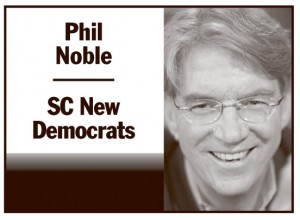Can you name the state’s most famous song?
What if I asked you to name the most famous song that has come from South Carolina?
You’re stumped, right?
About now, you are scratching your head and thinking, “What could it be?”
What if I told you that the song is famous as the unofficial anthem of a huge social movement that affected tens of millions of people in America?
And what if I told you that the song had a huge impact globally and inspired tens of millions of people who sang it as a song of freedom and liberation in dozens of countries around the world?
And what if I told you that the song has even been adopted as the national anthem of a new county?
About now, I’ll bet you are feeling a little uneasy to think that you live in South Carolina and have no idea what song I’m talking about — right?
The song is “We Shall Overcome.”
No one knows the precise origins of the song, but we do know that it was first sung as a protest song in Charleston. In 1945, the song was sung during the Food and Tobacco Workers Union strike against the American Tobacco Company, which ran the cigar factory on East Bay Street in Charleston.
This mammoth cigar factory once produced more than a million cigars a day, and the workers who produced them were mostly African-American women, many of whom came into the city daily from the surrounding Sea Islands. They worked for low wages, in poor working conditions for long hours. And if they complained … well, you know the rest of the story.
As the five-month strike dragged on, the picketing women began to sing this simple song to boost their spirits and provide encouragement to each other.
One of the supporters of the strike, a white woman named Zilphia Horton, was so moved by the song that she submitted it for the 1948 issue of the “People’s Songs Bulletin.” Horton was the music director of the Highlander Folk School in Monteagle, Tenn., and she played the song for the many people who visited the school. Among those who were captivated by the song were Pete Seeger and Guy Carawan. Carawan is credited with introducing the song to the civil rights movement when he later became music director of Highlander in 1959, as many of the movement’s leaders were in and out of the Highlander School.
Seeger made some minor modifications to the song and added some verses, but most importantly, he performed the song in his 1963 world tour to 22 countries — thus he is credited with spreading the song globally. And when Joan Baez sang the song before 300,000 people at the August 1963 March on Washington, the song forever earned its place not only in the U.S. civil rights movement, but also history.
Seven months later, President Lyndon Johnson used the phrase “we shall overcome” in his address to a joint session of Congress. He was urging support of his voting rights legislation just after the “Bloody Sunday” attack on marchers at the Pettus Bridge in their march from Selma to Montgomery.
And, on March 31, 1968, just before his assassination in Memphis, Dr. King used “we shall overcome” as the theme of his final sermon.
Beyond the United States, the song has played an important role in many popular struggles for human rights all over the world. The two best known examples were the Catholic protest in Northern Ireland in the 1960s and ‘70s and the student protests in China’s Tiananmen Square in 1989. It was later adopted by various anti-Communist movements in the Cold War and post-Cold War era, especially the Velvet Revolution in Czechoslovakia in 1989.
But its global impact goes far beyond just these examples. The song has played an important role in human rights movements in India, among the Aborigines in Australia, in France, South Africa, Martinique and Guadeloupe, Zimbabwe, Ecuador, Bolivia, Palestine and many other territories and nations around the world. After their long struggle for independence, in 2002 the people of East Timor briefly made “We Shall Overcome” their national anthem.
So now you know.
People far more knowledgeable than I can analyze why this song took on the significance it did. Part of it is that the lyrics are simple and easy to remember and repeat; the melody is also simple and easy to adapt for most any instrument — most importantly, for the human voice.
The power of the song’s simple affirmation of hope and determination is compelling — to many people in many circumstances in many places the world over.
This simple song, first sung in our state, has inspired, moved and sustained millions around the world in their fight for dignity and freedom.
We should all be very proud of this.
Phil Noble is a businessman in Charleston and president of the S.C. New Democrats, an independent reform group started by former Gov. Richard Riley. He can be reached at phil@scnewdemocrats.org.




























